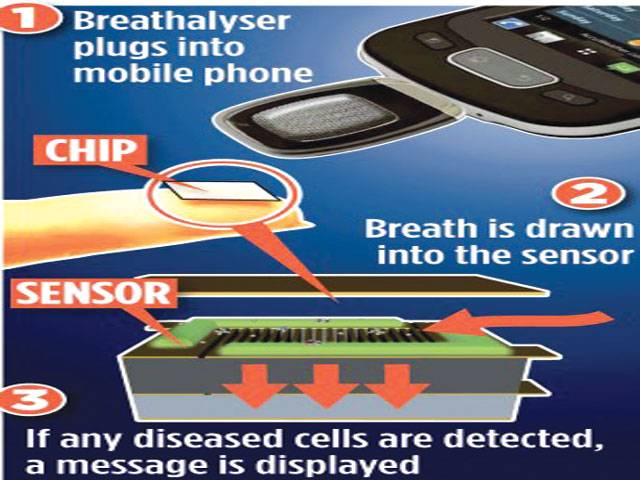London - Imagine blowing into your mobile phone to check whether you have cancer. That might sound fanciful and even scary but scientists at a British firm say they are now just two years away from making it happen.
The inventors, at Cambridge University spin-off company Owlstone, have already created a desktop ‘disease breathalyser’ which is proven to work. Now they are miniaturising their technology further, to create a small add-on device that simply slots into the base of a mobile.
Owlstone co-founder Billy Boyle says: ‘To make a standalone hand-held device, or a module that attaches to a mobile phone, is as little as two years away. It’s just a question of getting the investment.’ The firm – set up a decade ago by three engineering graduates – started out making machines to help oil firms detect contamination, and US anti-terror agencies pick up traces of explosives.
But 18 months ago Belfast-born Boyle decided to take the firm into the medical arena after his girlfriend Kate, the mother of their four-year-old twins Oscar and Isaac, was diagnosed with colon cancer. She was only 34 at the time. ‘Kate was taken into hospital with stomach pains,’ Boyle says.
‘That day, she had emergency surgery. We then found out she had Stage 4 colon cancer.’He read up on statistics for the disease, which hits 40,000 people in Britain every year, and was shocked by how much early detection determines survival and how hard diagnosis can be. ‘If it’s detected at Stage 1, the chances of survival are 90 per cent,’ says Boyle, 35. ‘At Stage 4, it drops to six per cent.’
The couple married a year ago, Kate is currently undergoing more chemotherapy and Boyle began looking at how Owlstone’s know-how could identify diseases earlier.
At the heart of the technology is a fingernail-size microchip that can be programmed to ‘smell’ whatever chemical is of interest. It can pick up chemicals at incredibly low levels – at parts-per-trillion concentrations.
This makes it ideal for detecting what Boyle calls the ‘telltale chemical fingerprints of disease’. These ‘markers’ can be exhaled in breath, or passed in urine or faeces. Over the past year, Owlstone’s desktop ‘Lonestar’ device – which looks like a chunky iPad with a breathalyser tube – has been tested on a number of different markers for disease. Researchers at Warwick University used it to discriminate between healthy people, those with the bowel condition colitis, and those with colon cancer. Rather than breath, they have been checking for certain smelly chemicals in urine vapour. The trial has been a success.
Boyle adds: ‘With colon cancer, markers are generated at the very early stages.’ That raises the possibility of replacing the NHS ‘faecal occult blood test’ – which relies on people collecting stool samples and sending them off in the post. ‘People don’t like doing the test and it’s not very accurate,’ notes Boyle, who will be speaking at the WIRED Health summit in London on Tuesday.
The current test throws up too many false alarms, meaning that many people have colonoscopies to check for tumours or polyps, when none exists. This procedure, which involves a metal tube being inserted up the anal passage, carries a small risk of serious complications and is also expensive.
‘The hope is our technology will give us a screening tool that has better diagnostic accuracy, so fewer people will be sent for unnecessary colonoscopies,’ says Boyle. Tests on urine will probably stay in the consulting room. But it’s possible we will be using mobile breathalysers to check for other deadly diseases, such as lung cancer and chronic obstructive pulmonary disorder.
Owlstone has just won NHS funding to test if its technology can detect lung cancer by ‘smelling’ patients’ breath. And last month, US researchers suggested their own ‘electronic nose’ was as good as mammography at detecting breast cancer. Liver disease and kidney failure are other areas being looked at.
But do people want their mobiles to detect a killer disease? Shouldn’t that information always come from a doctor? Boyle admits the best place to receive such news may always be the doctor’s. Nonetheless, he says: ‘I think in the future people will want more information about their own health. And there are lots of diseases where early detection matters.’Billy Boyle will be speaking at the WIRED Health summit at 30 Euston Square, London, on Tuesday, April 29.
Saturday, April 20, 2024
Mobile phones can check cancer signs

Caption: Mobile phones can check cancer signs
8:09 AM | April 19, 2024
Balochistan to procure 500,000 metric tonnes of wheat, decides cabinet
8:30 PM | April 20, 2024
Maryam using unfair tactics to manipulate ballot in by-polls, alleges PTI's Saif
8:19 PM | April 20, 2024
PMD forecasts dry weather for most parts of country
8:17 PM | April 20, 2024
PM Shehbaz says Pak-China economic, cultural relations developing swiftly
3:58 PM | April 20, 2024
One killed, 8 injured in explosion at Hashd al-Shaabi militia group’s headquarters
3:21 PM | April 20, 2024
Policitising Tragedy
April 20, 2024
Tehran to Rafah
April 20, 2024
A New Leaf
April 20, 2024
A Tense Neighbourhood
April 19, 2024
Dubai Underwater
April 19, 2024
Dangers of Deepfakes
April 20, 2024
Feudalism
April 20, 2024
Kite tragedy
April 19, 2024
Discipline dilemma
April 19, 2024
Urgent plea
April 19, 2024
ePaper - Nawaiwaqt
Advertisement
Nawaiwaqt Group | Copyright © 2024





